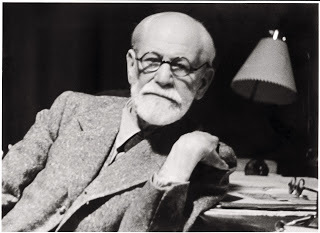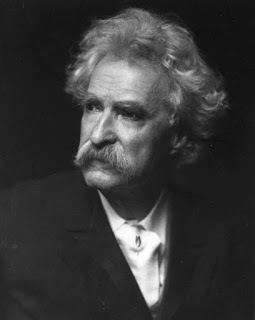E IS FOR EASY MONEY? and IWSG by the ghost of MARK TWAIN
“The creative writer does the same as the child at play; he creates a world of fantasy which he takes very seriously.”
- Sigmund Freud

The ghost of Mark Twain had flitted away to play poker with Oscar Wilde and Eudora Welty.
All three cheated terribly, but they played for the conversation not the money.
After all, being ghosts, where would they spend it?
I wondered why Freud was so intent on this Free Association with me.
Jung thought Freud analyzed others to avoid his own problems.
Jung once demanded of him: “Who has the neurosis?”
Freud’s daughter, Anna, agreed,
noting that the very act of being a psychotherapist is a defense from your own neuroses.
Now, fully white in both hair and beard, Freud sighed,
"Finally, perhaps we can get some serious exploring done in your unconscious."
He adjusted his glasses more firmly on his nose.
"We are at E. What occurs to you immediately upon hearing that letter?"
"Easy Money," I smiled.
Freud fought a grimace. "Even though he is not here, Twain is still contaminating the process."
"I mean it. I thought of Easy Money."
"And why do you believe you thought of that phrase, Roland?"
"By 1925, your fame had spread so widely that movie producer Samuel Goldwyn offered you, whom he called the 'greatest love specialist in the world,'
$100,000 to write or consult on a film script about 'the great love stories of history.'"
I shook my head in wonder.
"Yet, in spite of that eye-popping offer, you turned it down as you did a $25,000 offer the year before from the publisher of the Chicago Tribune
to psychoanalyze the famed criminals Leopold and Loeb as they awaited their sensational murder trial"
I scratched my chin. "Why did you turn them both down?"
Freud smiled sadly. "Because there is nothing easy to Easy Money, Roland."

Ghost of Mark Twain here to spell the boy for IWSG:
"I haven’t any right to criticize books, and I don’t do it except when I hate them."
- Mark Twain
Ghost of Mark Twain here:
I try not to criticize that Stephanie Meyer gal to Roland, but her books madden me so that I cannot conceal my frenzy from him.
I have to stop every time I begin.
Every time I read any of those Twilight/Good Night books, I want to dig her up and beat her over the skull with her own shin-bone.
Then, I realize that gal ain't dead yet. Maybe I can convince the ghost of Lovecraft to fix that for me, don't you know?
I just flat couldn't finish any of those DEAD books by that filly Charlaine Harris. If she would listen, I would tell her that a successful book is not made of what is in it, but what is left out of it.
Not that any woman no how ever listened to me when I was talking sense.
That her books sell don't necessarily make them good.
The test of any good fiction is that you should care something for the characters; the good to succeed, the bad to fail.
The trouble with most fiction of today is that you want them all to land in hell together, as quickly as possible.
I know you friends of Roland are more open to listening than those two fillies, so I have a few hints at how to write yourselves a good novel --
1.) Writing is easy. All you have to do is cross out the wrong words.
2.) And while we are on the topic of editing -- NEVER POLISH THE FIRST CHAPTER UNTIL THE LAST ONE IS WRITTEN.
3.) A novel is like a young'un -- it grows in ways you never planned. Just type it out chapter by chapter, letting the growing pains take you where they will.
4.) A novel is like life -- things happen, new ideas suggest themselves, and intriguing possiblities arise. Throw them into the soil of your novel, you will be surprised at what the harvest will be.
5.) A novel to be novel must be novel. Don't have the dog wag his tail. Have his tail wag him.
6.) A novel is a dog house --
So is your house going to hold a small, a medium, a lagre dog -- or just for the husband when he is thrown out by his wife?
The size of the "dog" will dictate how you go about structuring your "house" (novel).
7.) Plots are limited. Characters are limitless. So always begin with the characters.
Your novel will shine, not by what you have going on in it, but by the breath you breathe into your characters.
8.) The characters you develop depend on who you are. Hemingway was Hemingway. Shakespeare was everybody else.
Remember:
A scrupulous writer, in every sentence that he writes, will ask himself at least four questions:
1. What am I trying to say?
2. What words will express it?
3. What image or idiom will make it clearer?
4. Is this image fresh enough to have an effect?
- Sigmund Freud

The ghost of Mark Twain had flitted away to play poker with Oscar Wilde and Eudora Welty.
All three cheated terribly, but they played for the conversation not the money.
After all, being ghosts, where would they spend it?
I wondered why Freud was so intent on this Free Association with me.
Jung thought Freud analyzed others to avoid his own problems.
Jung once demanded of him: “Who has the neurosis?”
Freud’s daughter, Anna, agreed,
noting that the very act of being a psychotherapist is a defense from your own neuroses.
Now, fully white in both hair and beard, Freud sighed,
"Finally, perhaps we can get some serious exploring done in your unconscious."
He adjusted his glasses more firmly on his nose.
"We are at E. What occurs to you immediately upon hearing that letter?"
"Easy Money," I smiled.
Freud fought a grimace. "Even though he is not here, Twain is still contaminating the process."
"I mean it. I thought of Easy Money."
"And why do you believe you thought of that phrase, Roland?"
"By 1925, your fame had spread so widely that movie producer Samuel Goldwyn offered you, whom he called the 'greatest love specialist in the world,'
$100,000 to write or consult on a film script about 'the great love stories of history.'"
I shook my head in wonder.
"Yet, in spite of that eye-popping offer, you turned it down as you did a $25,000 offer the year before from the publisher of the Chicago Tribune
to psychoanalyze the famed criminals Leopold and Loeb as they awaited their sensational murder trial"
I scratched my chin. "Why did you turn them both down?"
Freud smiled sadly. "Because there is nothing easy to Easy Money, Roland."

Ghost of Mark Twain here to spell the boy for IWSG:
"I haven’t any right to criticize books, and I don’t do it except when I hate them."
- Mark Twain
Ghost of Mark Twain here:
I try not to criticize that Stephanie Meyer gal to Roland, but her books madden me so that I cannot conceal my frenzy from him.
I have to stop every time I begin.
Every time I read any of those Twilight/Good Night books, I want to dig her up and beat her over the skull with her own shin-bone.
Then, I realize that gal ain't dead yet. Maybe I can convince the ghost of Lovecraft to fix that for me, don't you know?
I just flat couldn't finish any of those DEAD books by that filly Charlaine Harris. If she would listen, I would tell her that a successful book is not made of what is in it, but what is left out of it.
Not that any woman no how ever listened to me when I was talking sense.
That her books sell don't necessarily make them good.
The test of any good fiction is that you should care something for the characters; the good to succeed, the bad to fail.
The trouble with most fiction of today is that you want them all to land in hell together, as quickly as possible.
I know you friends of Roland are more open to listening than those two fillies, so I have a few hints at how to write yourselves a good novel --
1.) Writing is easy. All you have to do is cross out the wrong words.
2.) And while we are on the topic of editing -- NEVER POLISH THE FIRST CHAPTER UNTIL THE LAST ONE IS WRITTEN.
3.) A novel is like a young'un -- it grows in ways you never planned. Just type it out chapter by chapter, letting the growing pains take you where they will.
4.) A novel is like life -- things happen, new ideas suggest themselves, and intriguing possiblities arise. Throw them into the soil of your novel, you will be surprised at what the harvest will be.
5.) A novel to be novel must be novel. Don't have the dog wag his tail. Have his tail wag him.
6.) A novel is a dog house --
So is your house going to hold a small, a medium, a lagre dog -- or just for the husband when he is thrown out by his wife?
The size of the "dog" will dictate how you go about structuring your "house" (novel).
7.) Plots are limited. Characters are limitless. So always begin with the characters.
Your novel will shine, not by what you have going on in it, but by the breath you breathe into your characters.
8.) The characters you develop depend on who you are. Hemingway was Hemingway. Shakespeare was everybody else.
Remember:
A scrupulous writer, in every sentence that he writes, will ask himself at least four questions:
1. What am I trying to say?
2. What words will express it?
3. What image or idiom will make it clearer?
4. Is this image fresh enough to have an effect?
Published on April 05, 2016 22:00
No comments have been added yet.



